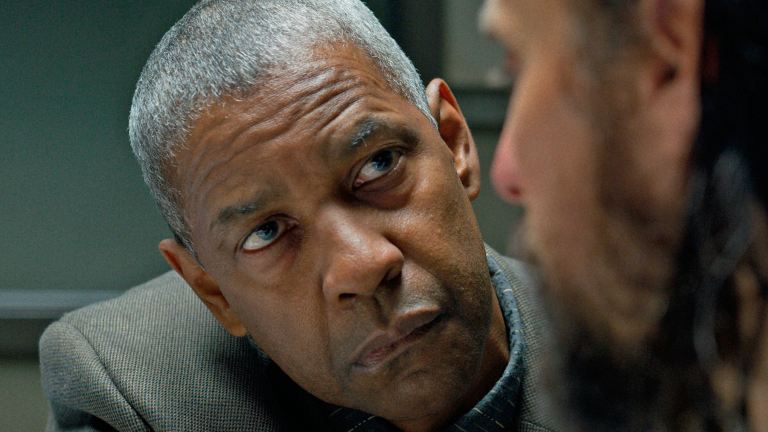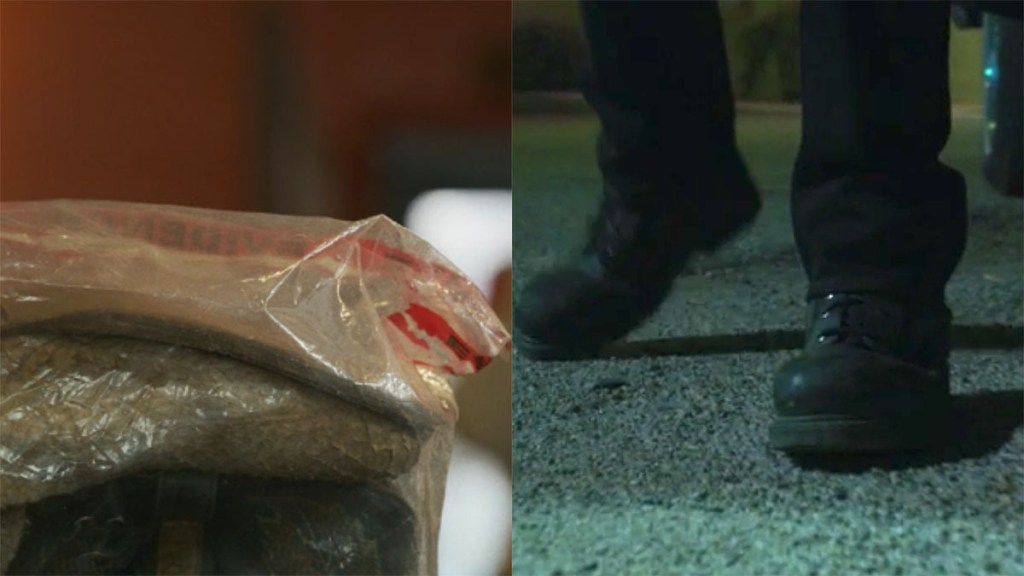The Little Things and the Mystery of Denzel Washington’s Character Explained
We examine the tragedy of Denzel Washington’s Joe “Deke” Deacon in The Little Things, and why people are suspecting the worst.

This article contains spoilers for Denzel Washington’s The Little Things. Read our spoiler-free review here.
The opening of John Lee Hancock’s The Little Things is pure adrenaline. A young woman minding her own business and rightfully bopping to the B-52’s “Roam”—and also making a nice homage to Buffalo Bill’s final victim in The Silence of the Lambs—is targeted by a mysterious driver who tries to run her off the road. Once cornered at a nearby gas station, the would-be victim is only able to escape by the skin of her teeth.
It’s all terrifying, partially because it likely has real world influences, and partially because the only thing she sees of her stalker is “cowboy boots.” The audience gets a better look at them than she does (as well as the duct tape he also collected from his trunk), but it’s not much to go on for investigators talking to the survivor of Los Angeles County’s new serial killer.
Yet it was enough to cause many viewers to get hung up on those boots… and the fact that Denzel Washington’s John “Deke” Deacon wears boots of his own at the end of the film. While covering up a murder. And planting evidence on a dead suspect. The movie was on HBO Max less than a day before the conspiracy theorizing began about Deke’s actual motives.
So then, is the online speculation correct? Could Deke be a serial killer who for years has been hiding his crimes from his fellow cops in plain sight? Not likely.
Accusations of Deke being the serial killer suggest a few interesting things about how we consume media, and how folks like to see law enforcement depicted in 2021… but it has little to do with the film’s actual plot. As you can glean from the image below, when the boots worn by the killer and those worn by Deke are placed side by side, it becomes obvious they’re different footwear. And neither actually belong to Washington’s character!
Indeed, the pair of boots Deke wears while raiding the murdered Albert Sparma’s home—and then later leaves in his motel room—is the evidence Joe first drove down to Los Angeles to retrieve in the first place: bloody shoes that would supposedly incriminate a suspect. However, the Los Angeles County Sheriff’s Department forced Deke to wait 24 hours to acquire the evidence, and by then their owner had made a deal confessing to his crimes back upstate. So Deke was left with a pair of shoes to dress up in but with no place to go.
Hence Jimmy Baxter (Rami Malek) wisecracking “nice boots’ after seeing Deke carry the bloody evidence bag into a diner. Nevertheless, Deke eventually does find a use for them—by wearing them to cover up Jimmy’s mistake. When Jimmy smashed Albert Sparma’s skull in, there was no concrete evidence that connected Sparma to any of the murders in the film. Leto’s creep has the air of a “charismatic serial killer,” but in truth he was probably just a crime buff who obsessed over the gory details. As Baxter originally said, “walk in confessors” are never the actual killer.
So Deke wore those boots to save Jimmy from what would’ve been a clear cut case of second degree murder, getting rid of anything that suggests Sparma was still living in Los Angeles when he died, and then buying a hair barrette to mail Jimmy, absolving him of his guilt.
But Deke did this only to help a friend. After all, Joe’s been there. When he was chasing who was possibly the same serial killer some years back, Deke shot one of the victims, unaware in the dark of night she was running for her life. He’s covered up one cop’s murder before (his own), so he did the same for Jimmy.
This doesn’t mean Deke is the serial killer. In fact, that seems almost impossible given his own personal grief and guilt over the death of Mary Roberts, the woman he shot in the woods, throughout the movie. Deke really believes he can be these victims’ “angels,” yet all he and Jimmy end up in is a living hell.
Yet the tropes which inform Deke’s troubles, and some audiences’ suspicion, makes for a fascinating contrast. With a screenplay first written by Hancock in 1993, The Little Things both lightly critiques and embraces what were then only burgeoning tropes in the ascendant serial killer genre. A year prior to the script’s writing, Silence of the Lambs won a slew of Oscars, including Best Picture, by thriving on the duality between a young FBI trainee named Clarice Starling (Jodie Foster) and the incarcerated serial killer who became a pseudo-mentor and ally to her, Dr. Hannibal Lecter (Anthony Hopkins).
Hollywood was coming to embrace the ambiguity between the hunted and hunter, with the law enforcement heroes like Clarice being just as obsessed as the predatory killers they pursue. This becomes much more pronounced in 2001’s Hannibal where there is a symbiotic relationship verging on romantic between Clarice and Hannibal (which is explicit in the book). But by the time that belated sequel came out, there had been a decade of serial killer and investigative police procedurals in Silence of the Lambs’ wake, plus unproduced screenplays like The Little Things.
By now you know this convention about the cop and killer: where one says “you and I are not so different” (a line Sparma speaks to Baxter in The Little Things), and the two suffer from a near false equivalency in characterization. This reached farcical heights in John Woo’s action-opera, Face/Off (1997). The Little Things is of course more grounded than those things, including Silence of the Lambs, which reveled in the image of Hannibal Lecter walking free in the streets in the final shot, a wolf among the sheep.

By contrast the killer remains hidden throughout The Little Things, and the cops are never certain about anything. When they take heroic Hollywood action, like getting in the car with the killer and breaking all the the rules, they pay for it by having to cover-up a murder. Still, the movie sympathizes with them no differently than how Hannibal might with its image of Clarice going rogue to capture the serial killer—it just ends a lot worse for Jimmy and Deke.
In the end, The Little Things very much seeks to maintain the grandeur of cops sacrificing everything—including their ability to live with themselves—for the greater good. It’s still a romantic view of law enforcement doing what needs to be done, even if that means filling a hole in the desert with an innocent man.
I imagine this might be what audiences are really responding suspiciously toward—Deke’s justifications and rationalizations for cops with blood on their hands. Denzel Washington is as charismatic and heroic here as when he played a cop chasing a serial killer in 1999’s The Bone Collector. But unlike that happy-go-lucky thriller, The Little Things has Washington cover up crimes committed by the police. Twice. That is landing with viewers differently in 2021, one year after the death of George Floyd, Breonna Taylor, Ahmaud Arbery, and so many other lives wrongfully lost to police officers, or those whom authorities ultimately chose not to prosecute.
Deke’s choice to protect his brother in blue, even if Sparma potentially never killed anybody, is why folks might really be looking for an excuse to (further) condemn The Little Things’ troubled cop.
